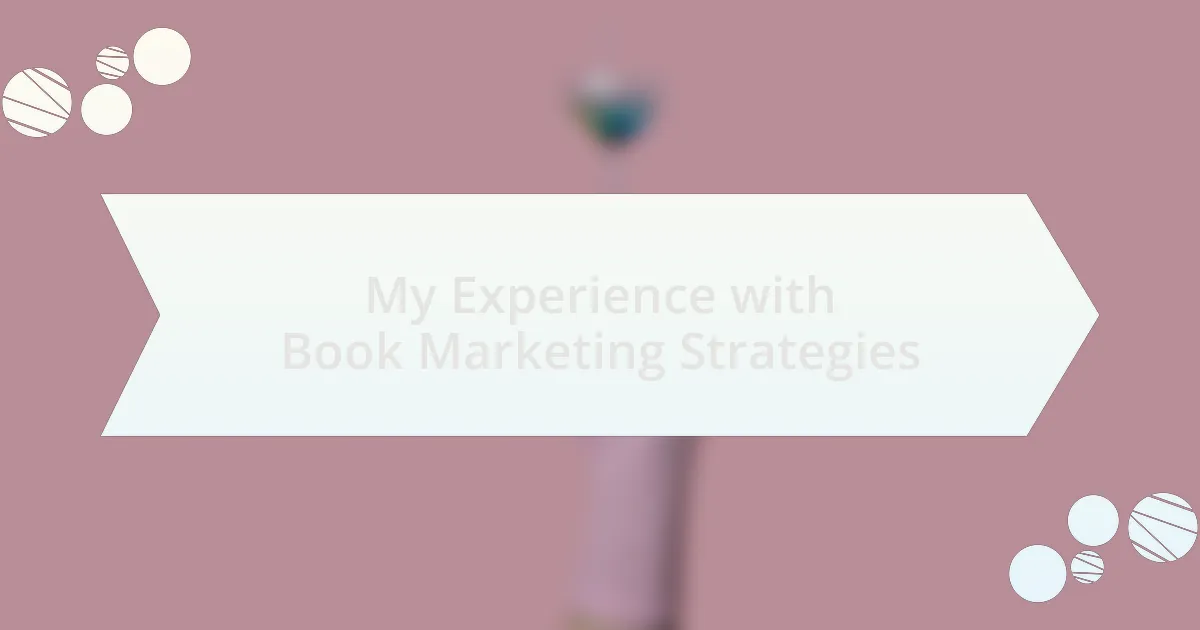Key takeaways:
- Clara Whitmore emphasizes the importance of an author’s website as a reflection of their personality and brand, fostering connections with readers.
- A professional website enhances credibility, usability, and allows for direct communication with the audience, transforming casual readers into dedicated fans.
- Whitmore’s journey in website creation highlights the importance of designing a space that accurately represents the author’s voice and encourages community engagement.
Author: Clara Whitmore
Bio: Clara Whitmore is an acclaimed author known for her gripping psychological thrillers and lush literary fiction. With a background in psychology and a passion for storytelling, Clara intricately weaves complex characters and suspenseful plots that leave readers on the edge of their seats. Her debut novel, “Whispers in the Shadows,” was a finalist for the National Book Award and has won multiple accolades for its powerful exploration of the human psyche. Clara resides in Seattle, where she draws inspiration from the city’s moody landscapes and vibrant literary community. When she’s not writing, she enjoys hiking in the Pacific Northwest and engaging in local book clubs.
Understanding an author’s website
An author’s website serves as a crucial digital hub that reflects not just their work but also their personality and brand. I remember the first time I launched my own site; it felt like opening the doors to my creative world. Every section, from the bio to the book descriptions, told a part of my story, and I realized how essential it was to create a space that resonated with readers.
Have you ever visited an author’s website and immediately felt a connection? That’s what I strive for with mine. The design, the imagery, and the content all play a role in fostering that bond. For example, I chose a clean layout that highlights my latest book while providing easy access to my blog and events. This isn’t just a matter of aesthetics; it directly impacts how readers perceive me and my work.
Understanding your audience is vital when developing an author’s website. When I first started, I noticed how my site evolved as I learned more about what my readers wanted. Incorporating elements like a newsletter sign-up or interactive features transformed my website from a static page into an engaging experience, making visitors feel valued and more inclined to return. Have you considered what your audience seeks when they land on your site?
Importance of a professional website
Having a professional website is not just about showcasing your work; it’s the cornerstone of your author brand. I recall a time when I didn’t prioritize my website’s design—it looked cluttered and uninviting. Soon enough, I realized that a polished, professional look was essential for building credibility and trust with my audience. When readers come across a well-crafted site, they’re more likely to take you seriously as an author.
Another crucial element is usability. I remember redesigning my website to ensure it was mobile-friendly after noticing many visitors accessing it via their smartphones. This not only improved user experience but also increased my site traffic significantly. Have you thought about how easily readers can navigate your pages? If they struggle to find information, they may leave quickly, losing out on a potential connection.
Moreover, a professional website allows you to maintain direct communication with your audience. I vividly recall launching my first newsletter through my site. Being able to share updates, insights, and exclusive content made readers feel involved in my journey. This level of engagement is invaluable; it turns casual readers into dedicated fans who are eager to support your work. How are you currently interacting with your readers?
My journey in website creation
Creating my website was an evolution born from necessity. Initially, I thought a simple blog would suffice, but as my writing career progressed, I realized that I needed a platform that accurately reflected my voice and vision. I remember spending countless nights brainstorming ideas and watching tutorials, hoping to create something that truly felt like home for my readers. Do you ever feel overwhelmed when trying to express your identity online?
One of the most challenging aspects was choosing the right layout and color scheme. I experimented with various styles before landing on one that felt just right. I wanted my site to convey warmth and creativity, mirroring the essence of my books. There was a moment of sheer delight when I finally clicked “publish” and saw everything come together after weeks of hard work. How gratifying is it to see your labor of love materialize into something tangible?
As I delved deeper into website creation, I learned the importance of incorporating elements that would foster community. I introduced a blog section, where I share behind-the-scenes stories and writing tips, enriching the experience for my visitors. This intentional touch has sparked meaningful conversations with readers, and it’s fascinating to see how a simple website can create a sense of belonging. Have you thought about how your website can serve as a gathering place for your audience?

Leave a Reply